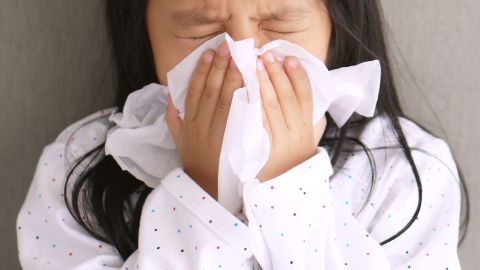What to do if your child has a respiratory infection? Our medical analyst
CNN
—
A common respiratory virus, respiratory syncytial virus, is surging in the United States, leading to some children’s hospitals being overwhelmed. The influenza virus is also on the rise, along with other viruses — such as adenovirus and rhinovirus — that cause the common cold.
At the same time, children are back at school and families are returning to many in-person activities, often without the mitigation measures applied during Covid-19, heightening the possibility for viral spread.

What kinds of respiratory infections can be treated at home — and with what treatments? Which symptoms should prompt a call to the doctor, or for parents and caregivers to bring their children to the hospital? When should children stay out of school? And what are the precautions families can take to reduce the spread of respiratory viruses?
To help us with these questions and more, I spoke with CNN Medical Analyst Dr. Leana Wen, an emergency physician, public health expert and professor of health policy and management at the George Washington University Milken Institute School of Public Health. She is also author of “Lifelines: A Doctor’s Journey in the Fight for Public Health” and the mother of two young children.
CNN: Why are respiratory infections on the rise?
Dr. Leana Wen: They have always been common among children. Before Covid-19, it was the norm, especially during the fall and winter, for schoolkids to have runny noses and coughs.
Now, they may be increasing in part because mitigation measures taken during the pandemic — like social distancing, masking and avoiding large gatherings — resulted in fewer respiratory viruses being spread over the past two winters. As a result, a lot of kids don’t have the immunity they normally would.
My own kids have already had at least three bouts of respiratory illness each since they started back at kindergarten and preschool less than two months ago. Thankfully, they recovered well and did not get severely ill, but I certainly understand the worry and distress that parents and caregivers feel when our children are sick.
CNN: Which respiratory infections can be dealt with at home?
Wen: The vast majority of respiratory infections in children can be managed at home with fluids, fever-reducing medicines and rest. What’s causing the infection is generally not the key determining factor in whether a child needs hospital care — it’s how the child is doing.
Respiratory syncytial virus, also known as RSV, is concerning on a public health level because some hospitals are getting full with children who have it. Prior to the Covid-19 pandemic, the US Centers for Disease Control and Prevention estimated that virtually all children will get RSV before their second birthday — and that some 58,000 kids will end up being hospitalized for it every year. Clearly, RSV is a very serious infection among some children, and parents should know what to watch for to spot severe illness. But also keep in mind that the vast majority will have mild, cold-like symptoms and will not need to be hospitalized.
The same goes for other viruses. Influenza can cause very severe illness, as can Covid-19. However, most cases in children do not result in hospitalization, and symptoms can be managed at home. On the other hand, there are viruses that one typically associates with a mild cold, like adenovirus, that can cause some children to become very sick.
If you end up going to the emergency department, your child will probably get tested for Covid-19, influenza and RSV. Some pediatricians would do this too. If your child were hospitalized, they might get additional virus testing. But a lot of doctor’s offices wouldn’t provide such care because, again, the actual virus leading to the illness is less important in determining whether your child needs to be hospitalized than how your child is doing.
The exception is very young infants — generally those under 2 months of age — who are typically tested and monitored more.
CNN: What other risk factors should lead to parents watching for severe illness?
Wen: Newborns are very vulnerable. They have little immunity and not much physiological reserve, meaning that once they get sick they could become very ill very quickly. Premature babies are also at risk. Many of them have underdeveloped lungs. A baby born two months premature has a physiological age two months younger than a baby born at term on the same day.

There are other factors to consider, too, including for young kids who have significant heart and lung disease, or are…
Read More: What to do if your child has a respiratory infection? Our medical analyst

